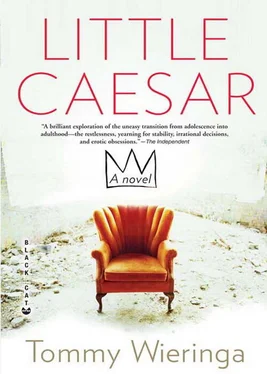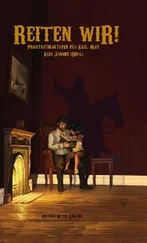‘Behave yourself,’ he said.
A few coals were still glowing in the hearth, I blew away the ash around them. With strips of bark torn from the split logs beside the fireplace I brought the fire back to life.
‘Careful you don’t blow it out,’ Linny said.
I had blown too hard, the little flames had sunk back into the orange glow.
‘People have a hard time letting a fire be,’ she said.
‘I’ve done this before,’ I said as casually as I could.
Her voice, laced with delicate threads of mockery: ‘You’d rather I didn’t get involved?’
I nodded.
‘That’s always a touchy thing with men, isn’t it,’ she said. ‘Cognac?’
From the ashes there grew an orange blossom, shivering in the gentle flow of my breath. When the fire had acquired enough strength I fed it with a few thin logs of birch. I sat back in the easy chair beside hers.
‘Alexandria,’ she said, ‘that’s where we left off. Please continue.’
Up from my memory loomed Mrs. Pastroudis, my first piano teacher. My mother had signed me up for lessons, she felt that an instrument would allow me to better express my emotions. At the end of each session, Mrs. Pastroudis noted my achievement in a hardbound ledger: finger positioning, finger exercises, scales, harmonics. She wrote excellent! and outstanding! beside all of them. Her warm, heavy hand lay on my head throughout most of the lesson. The piano was in the basement, in her living room. She talked a great deal about the past. Once her family had owned the entire building, now she possessed only the lower floor. She remembered the parties in the salon above her head, the beau monde of Alexandria. On the breath of a sigh, a name would sometimes cross her lips.
‘Constantine Cavafy even came here sometimes.’
Along with the wave of nationalizations set in motion by the young Colonel Nasser, her family had lost almost all its holdings. Revolution is redistribution. Most of the Greeks had left Alexandria, but Mrs. Pastroudis had stayed in order to write excellent! and outstanding! in my ledger.
My mother and I lived alone in our big house. The servants’ quarters were occupied by Eman, the maid. A forest of bushes and trees encircled the villa, overgrown fences separated it from the other homes. The gardener sprayed every day, the leaves were hung with sparkling droplets. No ray of sunlight ever penetrated to the lowest layers, it was damp and dark there, crawling around beneath the growth the red soil clung to your fingers. The trunks were overrun with epiphytes, fleshy, ineradicable. Before the windows were wooden shutters, a guard kept watch at the gate.
The rooms of our house were separated by thin sheets. During the day, blocks of sunlight slid across the tiles, cats lay napping on the warm stones. Beyond each curtain you were lured further into that Byzantine temple. An emerald-green, submarine glow: you could hear your own heartbeat. Voluptuous, I’d call it in retrospect, the One Thousand and One Nights . Perhaps my father had lost his way in my mother’s veiled world of shadows, where eunuchs and odalisques haunted the corridors. His world was that of the barracks, the rectangle.
They called me Caesarion, little Caesar. My pet name. Caesarion was the son of Cleopatra and Julius Caesar. He and I had both been born in Alexandria. In his case, the priests had hastened to announce that he was born of the union between Cleopatra and the god Amon-Ra, in the earthly incarnation of Julius Caesar. Didn’t my mother know that Caesarion was the mocking nickname people gave to Ptolemy Caesar? Little Caesar?
It was my pet name for special occasions.
‘Caesarion, play what you play so well, darling. .’
Then I would take a little bow and climb up onto the piano stool with its pile of cushions. Caesarion was the name of the theater production we performed together, with me as wunderkind and she as the mother who had hatched that golden egg. I played Für Elise and the Moonlight Sonata . A mazurka by way of encore, and that was pretty much my entire repertoire. I slid off the stool, received the cooing and the clapping and let myself be pawed at length by the ladies present. Little princes must be buffed until they gleam. This was Circus Wunderkind, a handful of rickety old pieces I had learned from Mrs. Pastroudis and my mother, who acted as though I were Wolfgang Amadeus himself. Sometimes I shirked the duty of putting myself on display and hid in that gigantic Roman villa. Eman’s slippers would hiss across the tiles as she searched for me — Lewd-week! Lewd-week! It was easy to disappear in that house, built as it was entirely of shadows and bound together by the thick veins of ivy growing outside along the sandy stucco: an exoskeleton turned to wood.
She takes me often to Le Salon Trianon, the Palace of Heavenly Pastries. I am allowed to order my own Douceur Surprise, an Om Ali aux Noisettes or the Trois Petits Cochons. She corrects me when I mispronounce the French. That is her principal contribution to my education. All those pies and pastries revolving in a lighted display case, my nose pressed to the glass I behold the orbits of those galaxies of sugar — the friendly crème caramels! The cheerful Banana Brasiliennes! The prim Tarte aux Fruits! My mother sips at little cups of coffee and smokes cigarettes. She comes here all the time. Beneath the lacquered wooden ceiling she dreams she is in Europe, but then a weird, distorted Europe. An outpost where people try to remember exactly what Europe was, and do their best to make it resemble those memories as closely as possible. At Trianon, air conditioners imitate the coolness of northern Europe, loudspeakers drip the saccharine stalactites of Mantovani. The uniformed staff act as though we were at the Hermitage in Monaco. My mother sees the tatters and spots on the vests of the waiters and the restroom attendants, but the maître d’s impeccable black suit makes up for a great deal.
‘And the handles on the toilets don’t stick either,’ I hear her say whenever she sings the praises of Trianon.
The restroom attendant hands her a tissue after she’s washed her hands, then cleans the sink with a cloth. That is my mother’s idea of heaven: a gossamer web of services rendered.
‘Draw the things you see on the walls, my prince,’ she says whenever I get bored.
I trace out the lines of the murals, copy those mysterious, tobacco-tinted women with expressions of promise on their faces: figures from One Thousand and One Nights , turbaned women with their breasts bared, illustrations of the dissolute Orient. The colors have disappeared beneath the sediment of sticky dust and nicotine.
We spend a few afternoons each week in that high-ceilinged salon, our backs turned on the gnawed-down world outside with its smell of rotting and the eternal desert dust crumbling down from the sky. Again I hear that name, for he once visited Trianon as well — Cavafy has been here . Little wonder that he had been everywhere: the city is an island, jammed in between sea and desert; freedom of movement is limited here.
The espresso machine hisses and blows clouds of steam. The loud hammering of the handles when the coffee grounds are knocked out, the machine’s red casing, fitted with sparkling silver parts, manometers and thermometers, the trumpeting of the steam pipe: the machine is the living heart of Le Salon Trianon. My mother stares out the window, a mirror from the outside so that no-one can look in. On the other side Alexandrian life shuffles by, the entire impoverished society of the masses, that anthill of nerve-racking fiddling about without cohesion. Sounds from outside penetrate faintly into the salon, the zooming of myriad carrion flies on the cadaver of the city.
Читать дальше












